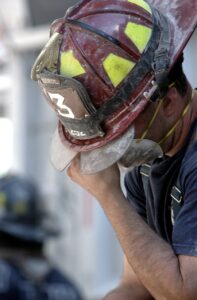As the 18th anniversary of 9/11 approaches, Steve Slocum offers his thoughts and feelings concerning the traumatic aftermath, personally and as a nation. I was blessed to write with Steve and offer a link to his current blog post as well as his post: https://www.steveslocum.com/9-11-its-time-to-address-our-trauma/
It happened 18 years ago: 9/11. If you’re in your mid-30s or older, I suspect you can tell me exactly where you were and what you were doing when you first heard the horrific news.
Me? I was driving to a conference in Tucson, Arizona as an employee of Raytheon Missile Systems. That day attendees from all over the US were flying in to Tucson for the conference. I answered my flip-phone when it rang. The voice on the other end said, “TURN YOUR RADIO ON AND LISTEN TO THE NEWS! SOMETHING TERRIBLE HAS HAPPENED!!” I pulled off the road and found a news station. I remember the initial reports surmised that an errant Cessna had flown into one of the World Trade Center towers. And I remember my world changing to surreal, slow-motion. I suddenly had heightened awareness as I attempted to mentally process the information I was receiving, but was not able to. What? An aircraft flew into a skyscraper?
I arrived at my conference in downtown Tucson as things were unfolding in real time. A friend in the parking lot asked, “I wonder if this will affect my stock portfolio.” I remember thinking, “What? This makes you think of your personal finances?” She seemed detached and unaffected, unaware that what she was saying made no sense. She wandered off, showing no emotion.
I walked into the conference area and saw a TV screen. I stared in horror as I watched the first video clip of the American Airlines 737 flying at high speed directly into the side of WTC-1. I couldn’t believe my eyes. I was witnessing the fiery deaths of all the passengers onboard. Then I watched the replays over, and over, and over. I later learned that the aircraft had taken off from Boston Logan International Airport with several Raytheon executives on board.
While still darkly captured in the replays, I was distracted by loud voices and another commotion. Suddenly I saw a second aircraft slam into the side of WTC-2. At this point my ability to consciously process what I was seeing completely shut down. I watched. I saw. But I was not intellectually processing. I had entered the dark nether-world of trauma. Watching replays of the horrific, seemingly slow-motion pancake collapse of the 110-story towers seemed only to hypnotize me and send me deeper.
The thing about trauma is that, although we might consciously know that something terrible has happened to us, we are usually not able to consciously process anything about it. During a traumatic experience, the part of our brain—the cerebral cortex— responsible for conscious thought and decision making literally shuts down. We innately move into a reactive mode where our ancient brain stem takes charge. It’s responsible for our survival instincts and autonomic processes, things like breathing and our heart beating. Hormones are released to energize our body as it readies to fight, or run away, or even freeze. Our body is designed to do whatever is necessary to survive in that moment.
 But trauma changes our brain and our body. Every cell in our being records trauma-related memories. Some are stored as sensations—sounds, smells, perhaps something we touched; some are captured as fragments of words, jarred thoughts with no beginning or end. Neuropathways in our brain responsible for communication between the brain stem, our limbic system and mid brain, and our cortex and forebrain can repeatedly reactivate these memories leaving us faltering, falling as if there’s no solid ground to stand on. Combat injury victims, rape victims, and domestic abuse victims may continue to function in their daily tasks but may not be able to discuss or even remember details about the horrors they have experienced. With time, some people innately return to a more neutral state, their heart rate slows, their breathing calms, hormones associated with relaxation are released and they return to a place of safety in their body and in their brain. Some people, however, stay in a reactive mode without even knowing. They might notice they are a bit jumpier, more reactive to loud sounds or strange smells, something is off, but they don’t quite know why. Other people know something is drastically wrong, but they don’t know what to do about it.
But trauma changes our brain and our body. Every cell in our being records trauma-related memories. Some are stored as sensations—sounds, smells, perhaps something we touched; some are captured as fragments of words, jarred thoughts with no beginning or end. Neuropathways in our brain responsible for communication between the brain stem, our limbic system and mid brain, and our cortex and forebrain can repeatedly reactivate these memories leaving us faltering, falling as if there’s no solid ground to stand on. Combat injury victims, rape victims, and domestic abuse victims may continue to function in their daily tasks but may not be able to discuss or even remember details about the horrors they have experienced. With time, some people innately return to a more neutral state, their heart rate slows, their breathing calms, hormones associated with relaxation are released and they return to a place of safety in their body and in their brain. Some people, however, stay in a reactive mode without even knowing. They might notice they are a bit jumpier, more reactive to loud sounds or strange smells, something is off, but they don’t quite know why. Other people know something is drastically wrong, but they don’t know what to do about it.
I was recently reminded about my own trauma related to 9/11 when my partner said she wanted to play the soundtrack from the Broadway musical, Come from Away, for me. Come from Away is a delightful depiction of how the town of Gander, Newfoundland, received over 30,000 diverted international guests who were airborne when the United States closed its airspace on 9/11. When my partner said she wanted to play it for me she said, “You might cry.” I said, “Sure, whatever,” having no sense that it would affect me emotionally. A soundtrack from a musical – really?
The story was intriguing. I loved it. But it was the phone calls that got me. Thousands of people were airborne when the attacks occurred and were diverted. People on the ground knew that something terrible was happening, and people in the air were unable to get through to their loved ones for some days after landing in their diverted locations. The songs portraying those desperate calls and connections awakened the trauma of that day for me. And the floodgates opened. I tried to hold it back, but couldn’t. I began crying uncontrollably, not consciously knowing why. It felt like I was having a flashback. My mind was flooded with horrific images. Each time I saw the ball of flame as the aircraft impacted the tower, I felt a deep pain of the sudden loss of life of that moment. This experience affected me profoundly and made me realize how deep and powerful is the trauma that still lives within me.
 But what do I do with this horror still trapped inside of me? And what does America do with the trauma she collectively holds from that awful day? A national response of retribution may have helped us feel safer for a moment and given us a rush of revenge, but it did nothing to heal our trauma.
But what do I do with this horror still trapped inside of me? And what does America do with the trauma she collectively holds from that awful day? A national response of retribution may have helped us feel safer for a moment and given us a rush of revenge, but it did nothing to heal our trauma.
Recovery from trauma is complex and requires great courage on the part of the victim. It goes beyond traditional psychotherapy. Salaam, the nonprofit I founded, is teaming with trauma experts to study and address America’s 9/11 trauma on an individual level, and collectively, as a nation. Stay tuned for more blog posts and materials to help with healing.
But on this 18th anniversary of 9/11, let us resolve to become more aware. More aware of the existence of trauma specifically around this event. So we can start to be more aware of how it affects us individually, and how it affects us as a nation. How it can feel right to ban all people from certain Muslim countries from setting foot in the United States. How unresolved trauma can produce support for other fear-based policies like walls, for profit prisons, family separations, and more wars.
 And even before we understand the physiological and psychological workings of our trauma, let us have the courage to take action. To reach out to our Muslim neighbors in friendship by inviting them to dinner or meeting them for lunch or coffee. As the rhetoric of fear ratchets up with our political cycle, our Muslim neighbors are living in fear of being targeted. Your extended hand of friendship in such a time would mean so much.
And even before we understand the physiological and psychological workings of our trauma, let us have the courage to take action. To reach out to our Muslim neighbors in friendship by inviting them to dinner or meeting them for lunch or coffee. As the rhetoric of fear ratchets up with our political cycle, our Muslim neighbors are living in fear of being targeted. Your extended hand of friendship in such a time would mean so much.
About Steve:
Having spent time in Kazakhstan as a missionary, Steve and his family learned the Kazakh language and experienced the culture of the indigenous Kazakhs. They were often on the receiving end of the iconic Muslim hospitality. It left a lasting impression.
Back in the states, Steve resumed his engineering career but grew uneasy with the growing levels of animosity towards Muslims. In 2018 he founded Salaam, a nonprofit organization whose mission is creating mutual understanding between Muslims and non-Muslims.
Steve is an ambassador for the Parliament of World Religions and is a presenter at the 2018 Parliament in Toronto. He is a frequent speaker at churches, mosques, and civic groups.
Regarding this blog post, he notes, “Many thanks to my coauthor for her insights into the physiology of trauma”:
Nancy E. Eichhorn, PhD
Founding Editor-in-Chief, Somatic Psychotherapy Today
www.SomaticPsychotherapyToday.com
Nancy@NancyEichhorn.com
Photo credits: Pixabay artists







